|
|
|
Sort Order |
|
|
|
Items / Page
|
|
|
|
|
|
|
| Srl | Item |
| 1 |
ID:
145313


|
|
|
|
|
| Summary/Abstract |
Albania's intelligence transformation began in earnest after the end of the Cold War and the country's transition to democracy in 1991. In general, democratic reform of intelligence is an onerous and taxing process,1 given democracy's demand for transparency and accountability which competes with intelligence's demand for secrecy. Albania, as have other Central and Eastern European developing democracies, encountered a panoply of challenges and complexities in its intelligence democratization endeavors. Utilizing Sir David Omand's Cheshire Cat metaphor for intelligence and democracy, we attempt to identify whether Albania, after nearly two decades of democratization, and currently a North Atlantic Treaty Organization (NATO) member and European Union (EU) candidate status country
|
|
|
|
|
|
|
|
|
|
|
|
|
|
|
|
| 2 |
ID:
090546
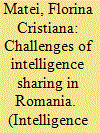

|
|
|
|
|
| Publication |
2009.
|
| Summary/Abstract |
The twenty-first century's security environment has triggered a phenomenon of 'proliferation' of intelligence and security cooperation, both domestically and internationally. After the ousting of the communist regime (whose intelligence system served the regime) in 1989, Romania embarked upon democratic reform of its new intelligence system (including strengthening cooperation), to better tackle the current security challenges. This has been a rather onerous process, yet worthwhile: Romania's intelligence is presently cooperating well with national and international partners, to counter national, regional, and global security threats. This paper assesses Romania's efforts in developing intelligence cooperation, after the demise of the communist regime.
|
|
|
|
|
|
|
|
|
|
|
|
|
|
|
|
| 3 |
ID:
151788


|
|
|
|
|
| Summary/Abstract |
Chile’s intelligence community has been transformed since the military dictatorship of General Augusto Pinochet ended and the country’s transition to democracy began in 1988/1989. Democratic reform of intelligence is a tedious and demanding process, given democracy’s call for transparency and accountability, which competes with an intelligence community’s vital need for secrecy.
|
|
|
|
|
|
|
|
|
|
|
|
|
|
|
|
| 4 |
ID:
155383
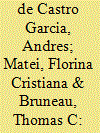

|
|
|
|
|
| Summary/Abstract |
European nations might consider an institutional option in their ongoing fight against terrorism. Research on intelligence reform globally indicates that certain institutional innovations to combating terrorism that may not have been seriously considered by decisionmakers in some European countries.
|
|
|
|
|
|
|
|
|
|
|
|
|
|
|
|
| 5 |
ID:
188290


|
|
|
|
|
| Summary/Abstract |
IJIC’s initiative to dedicate a full issue to challenges and progress in ensuring diversity and inclusion (D&I) in intelligence services from various continents is a welcome and timely initiative. To be sure, a zeitgeist of D&I policies emerged since the end of the Cold War and the terrorist attacks in the United States on 11 September 2001—which has paved the way for efforts toward diversifying intelligence agencies throughout the world. Nevertheless, despite progress, countries have yet to achieve a de facto and de jure routinization of D&I practices vis-à-vis intelligence. Much needs to be done toward effectively diversified intelligence, which, like intelligence transformation, involves a continuum of concerted, multi-faceted, political and institutional processes—a rather onerous task in intelligence agencies’ heavily bureaucratic environments.
|
|
|
|
|
|
|
|
|
|
|
|
|
|
|
|
| 6 |
ID:
091237
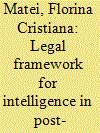

|
|
|
|
|
| Publication |
2009.
|
| Summary/Abstract |
A legal framework for intelligence delineates the rights, obligations, and powers of the intelligence organisations, as well as the arrangements for their governance and accountability, provides the intelligence system with guidance as to what it can and cannto do, indicates who is in charge and who oversees the activity of intelligence; insures that the intelligence apparatus is responsible before the law in case of abuses; makes sure that the IC benefits from legal protection if it observes the legally agreed guidance and directions.
|
|
|
|
|
|
|
|
|
|
|
|
|
|
|
|
| 7 |
ID:
130229
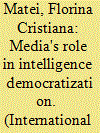

|
|
|
|
|
| Publication |
2014.
|
| Summary/Abstract |
In their path toward democratic consolidation, emerging democracies endeavor to ensure the democratic transfer of political power, bring changes in the legal framework, transform their executive, legislative, and judicial systems, boost free market economy, and develop robust and functional civil societies. They also institutionalize democratic civil-military relations (CMR) by establishing new security institutions-military, police, and intelligence agencies-that are under democratic civilian control, effective, and efficient. Of these many tasks, the democratization of intelligence agencies is by far the most daunting, as effectiveness and efficiency involve secrecy, while democratic control implies transparency, openness, and accountability. Nevertheless, democratic reform of intelligence in new democracies, though difficult, is not impossible, if and when civilians are interested and willing to "invest" in intelligence and intelligence reform. The contribution of external factors, such as media, 2 civil society, international groups, and individuals involved in human rights, may also be instrumental in achieving a balance between control and effectiveness of intelligence
|
|
|
|
|
|
|
|
|
|
|
|
|
|
|
|
| 8 |
ID:
091369
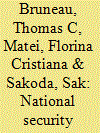

|
|
|
| 9 |
ID:
163087
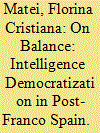

|
|
|
| 10 |
ID:
167474


|
|
|
| 11 |
ID:
171254
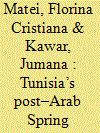

|
|
|
|
|
|
|
|